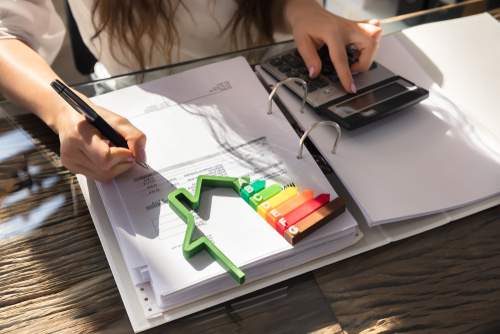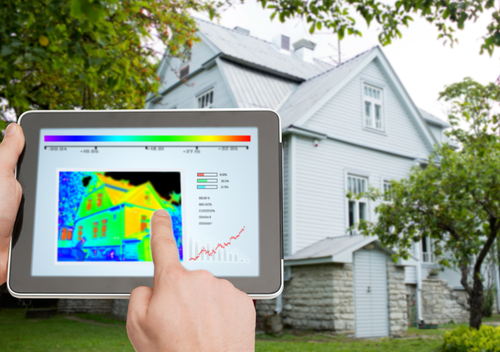Water and energy conservation are at the forefront of many peoples’ minds. As the cost of energy continues to rise, major droughts are also becoming a real threat in regions all across the country. Thus, as the number of people wanting to become environmentally friendly with their daily activities increases, it is important as a rental property owner to do your best to meet all of those concerns. In addition, it is helpful to share conservation tips with your tenants as well so you can work together to conserve water and energy in your rental property.

Contents of This Article:
- Why Is Conservation Important?
- Tips to Conserve Water and Energy in Your Rentals
- Care for Your Rental Property With BMG
Why Is Conservation Important?
Every household uses its fair share of utilities, such as electricity, water, and natural gas, to function on a daily basis. While your tenants likely wish they could forgo paying their monthly utility bills, there is just no way around it.
However, there are ways for them to save on their bills–by conserving water and energy. Not only will this lower your tenants’ utility bills, but it will also benefit the environment. Additionally, implementing energy-saving strategies in your rental properties can help keep your tenants there longer and attract tenants who value energy efficiency in the future. That’s why it’s important for landlords, tenants, and rental property management in Baltimore to develop ways to conserve water and energy in rental properties.
Today, we will discuss some of the best things you and your tenant can do together to save water and energy on your rental property. And in both instances, every little bit helps.
Tips to Conserve Water and Energy in Your Rentals
- Take a Look at Your Lighting
- Install a Low-Flow Showerhead
- Care for the Refridgerator

- Get Decorative
- Think About the Outdoors
- Use Power Strips
- Flush Your Way to Savings
- Kitchen Tips
Take a Look at Your Lighting
According to the experts at ENERGY STAR, one of the best (and easiest) ways you can help lower your tenant’s impact on the limited amount of energy resources available is to replace commonly used lightbulbs throughout the property with ENERGY STAR-certified lightbulbs. Providing a lot of light for very little energy output, compact fluorescent light bulbs (CFLs) not only save on the energy bill but typically last longer than traditional incandescent lightbulbs.
Further, though seemingly obvious, remind tenants to turn off lights when leaving a room and definitely when leaving the house. This waste of energy is unnecessary, and remembering to turn the lights off can make a big difference in the long run.
Install a Low-Flow Showerhead
Getting tenants to take 5-10-minute showers may be out of the question. And, if your tenant has a large family, monitoring water use can become overwhelming and frustrating, even if they want to reduce their use and their monthly bill.
However, installing a low-flow model showerhead can dramatically reduce water use without sacrificing the quality of water flow. In addition, if you want to take it one step further and really help your tenants save water, consider installing a smart shower adapter that slows the flow of water to a dribble while heating up. Then, once the water has reached an appropriate temperature, simply pull a cord to allow for the normal water flow. This may save your tenants up to 7,800 gallons of water a year for a family of three.
Care for the Refrigerator
You may not be aware, but your refrigerator is one of the biggest energy hogs in your property. By encouraging tenants to keep the fridge coils clean on the back of the appliance and adjust the internal temperatures to meet their needs, they can save a ton of energy and cash over the course of their lease term.
Get Decorative
Using window blinds, shades, or curtains can add some lovely visual appeal to the inside of your rental home. This is especially useful if you are giving walk-through tours of your property during a vacancy spell.
Better yet, these window treatments can appeal to potential tenants who wish to lower their energy bill and keep the property at a more consistent temperature throughout the season changes. After all, heavy curtains or shades will block heat loss during the winter and prevent heat gain during the summer. The great thing about window treatments is that they are adjustable for letting sunshine in or controlling privacy.
Think About the Outdoors
People often consider ways to conserve water and energy inside their rental property but fail to consider what is happening outside. Here are some great things to tell your tenants upon move-in that will help them save money and water:
- Do not overwater the lawn. If your rental property does not have an automatic sprinkler system for watering plants and grass, have tenants water in the early morning or late evening to prevent over evaporation.
- Get a nozzle. To prevent unnecessary water loss while watering the lawn or washing the car, outfit the hose with an adjustable spray nozzle to control the spray.
- Consider rain barrels. If allowed in your region, consider encouraging tenants to use rain barrels to water their lawns on sunny days. This natural water resource is a great way to reuse what nature provides.
- Maintain the yard. Regularly trimming back large bushes or shrubs and removing weeds will prevent overwatering of plants that do not need it.
Use Power Strips
Although it is probably impossible to get everyone, your tenants included, to unplug every appliance in your rental property that is not currently being used, there is a solution that can make a difference. For easy-to-reach areas, such as the kitchen, tenants can use power strips for appliances that are not always in use.
Things like the toaster, blender, coffee maker, and mixer are good examples. By plugging each of those into one power strip, your tenants can unplug the whole set of appliances more easily. The reverse is also true – re-plugging those appliances when needed will not seem like such a hassle.
Flush Your Way to Savings
To use less water per toilet flush, add a sealed plastic bottle filled with gravel inside the property’s toilet tank. This way, every time the toilet flushes, less water is used. This can be especially helpful for tenants with large families.
There is no realistic way of avoiding constant toilet flushes in your rental property. However, saving a bit of water per flush can make a difference over time.
Kitchen Tips
Here are some of the easiest things you and your tenants can do to reduce water use and energy output in the kitchen:
- Install ENERGY STAR-certified appliances
- Avoid defrosting frozen food with hot water
- Only run a full dishwasher and scrape rather than pre-rinse dishes
- Keep the freezer stocked at all times to maintain the coldest temps possible
- Do not open and close the oven multiple times while cooking
- Repair all leaky faucets and pipes; even a small drip adds up over time
- Ensure proper seals on refrigerator doors to prevent cold air loss through a worn seal
- If handwashing dishes, do not let water run constantly
Care for Your Rental Property With BMG
In the end, people use their fair share of water and energy on a daily basis. There is no way around that. However, by understanding the impact you and your tenants can have on the utility bills and environment by trying to conserve water and energy output, you can do a great deal of good in the long run.
If you have a rental property or are in the process of looking for a property management company that cares about not only your property but also your tenant’s monthly bills and the environment at large, contact Bay Management Group today.
Striving to meet the needs of owners and provide exceptional customer service to tenants, Bay Management Group not only handles all things property-related but also takes the extra step to educate both the property owner and the tenant on how to save money and become more environmentally friendly. Learn more about our services in Baltimore, Philadelphia, Northern Virginia, and Washington, DC today!


